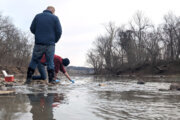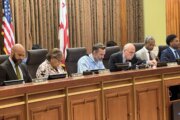Three federal workers have filed a lawsuit against the government seeking hazard duty pay because they said they were exposed to individuals infected with the coronavirus while on the job.
Three Federal Bureau of Prisons corrections officers, a VA hospital radiology technician and an Agriculture Department employee in the food safety inspection program are plaintiffs in the class action lawsuit, which was filed Saturday.
“If we’re expecting them to go into work and do these jobs to keep people safe and keep our county running and make sure there is food on the shelves for the rest of us, they should be getting this hazardous duty pay, because they’re risking their own safety and the risk that they’re going to take it home to their families,” said Attorney Heidi Burakiewicz, a partner at the private D.C. law firm Kalijarvi, Chuzi, Newman & Fitch.
Burakiewicz is the lead attorney in the lawsuit, which was filed in conjunction with the American Federation of Government Employees — the union representing the employees.
- Sign up for news alerts from WTOP
- Closings and delays
- As coronavirus spreads, organizations across the region seek volunteers
- Traffic and transit changes in DC, Md. and Va. during coronavirus response
- Coronavirus test results in DC, Maryland and Virginia
- Coronavirus FAQ: What you need to know
The lawsuit alleges that there are thousands of federal workers, like the plaintiffs, who have been exposed to coronavirus while doing their jobs and thus should receive the extra pay for hazard duty, called for under Title 5 of U.S. law covering federal employees.
Burakiewicz said general schedule federal employees, including tens of thousands of Bureau of Prisons corrections officers, would be eligible for 25% extra pay under terms of the law governing hazard duty.
A statement issued March 26 by the Bureau of Prisons said the agency is taking aggressive steps to protect the safety and security of all staff and inmates.
“We want to make sure that everyone that is going out there and risking their health and safety to go to work is getting what they are entitled to,” said Burakiewicz.








